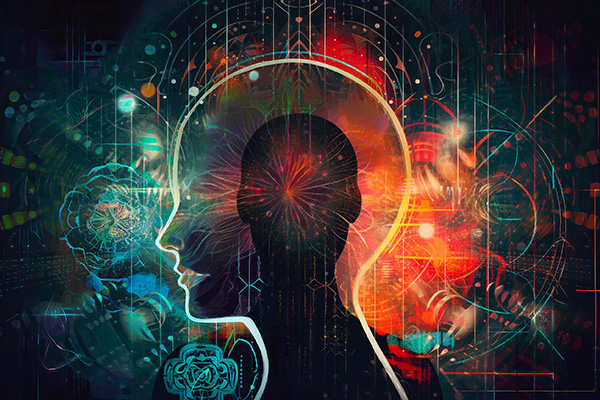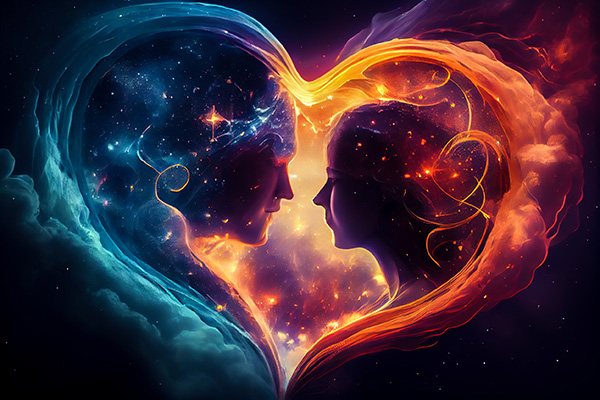psychotherapy
The Spiritual Power Of Neuro-Linguistic Programming (NLP)
 Neuro-Linguistic Programming (NLP) is a powerful therapeutic tool for those who view spirituality as a journey of personal growth, karmic healing, and soul evolution. NLP’s focus on reframing beliefs, improving communication, and cultivating self-awareness resonates deeply with modern spiritual aspirations.
Neuro-Linguistic Programming (NLP) is a powerful therapeutic tool for those who view spirituality as a journey of personal growth, karmic healing, and soul evolution. NLP’s focus on reframing beliefs, improving communication, and cultivating self-awareness resonates deeply with modern spiritual aspirations.
Rather than seeing NLP as simply a set of psychological techniques, many spiritually-minded people use it as a means of transforming inner blockages, clearing old patterns, and creating a life that serves their highest good. With NLP, personal growth becomes a conscious journey in which the mind, heart and spirit work together in harmony.
At its core, NLP emphasizes the power of our beliefs and the language we use – two aspects that are also relevant to spirituality. Many spiritual seekers strive to release limiting beliefs and align with their true self and divine potential, and NLP offers practical tools to make this personal transformation possible.
By teaching you how to identify and reprogram subconscious thoughts, NLP empowers you to change habitual responses, tap into your creative potential, and live with greater intention. This approach resonates with those of us on a spiritual path because it addresses one of the central concepts in several spiritual teachings and esoteric traditions: the belief that our inner world shapes our outer reality, and that by changing our mindset we can transform our life experiences.
When applied with a spiritual perspective, NLP becomes a means of aligning with one’s higher purpose, healing karmic wounds, and fostering self-love. By understanding how thoughts, emotions, and language interact to shape reality, those on a path of spiritual growth can use NLP to accelerate their journey and transform both their inner landscape and outer reality.
How To Deal With Toxic Drama Royalty
 These days, there is drama, crazy-making and toxic behavior everywhere you turn. And it’s not just on social media and public transportation…many of us have to deal with people in our personal and professional lives who are overly demanding, entitled, melodramatic, mean-spirited, always in victim mode, or just plain unhinged.
These days, there is drama, crazy-making and toxic behavior everywhere you turn. And it’s not just on social media and public transportation…many of us have to deal with people in our personal and professional lives who are overly demanding, entitled, melodramatic, mean-spirited, always in victim mode, or just plain unhinged.
Sadly, many of these spiritually handicapped souls are people close to us, people we care deeply about. It can be daunting to deal with their toxic actions and volatile behaviors, and trying to ignore them is exhausting and even impossible in the long run.
But other people’s dysfunction and drama doesn’t have to weigh down your spirit, and it doesn’t always have to be so difficult to deal with, especially with some spiritual support and backup.
The first rule to remember is that love works better than anything else. So, the first step should also be to offer the “drama royal” plenty of compassion.
Chances are the drama king or queen in your life is wounded in some way. Dysfunctional behavior and toxicity often stem from unresolved hurt or deep trauma.
Many people who exhibit dramatic or demanding tendencies often aren’t aware of how their behavior affects others. They may be caught in a cycle of emotional turmoil and, as a result, seek external validation through attention and theatricality. Rather than focusing on the label “drama,” it’s helpful to think of these behaviors as expressions of unresolved pain or unmet emotional or spiritual needs.
The Unresolved Karmic Bonds Between Souls
 Have you ever found yourself thinking about an old friend or flame that you haven’t spoken to in years, and they suddenly show up in your life in the most unexpected place? This often happens when we are still energetically connected to someone.
Have you ever found yourself thinking about an old friend or flame that you haven’t spoken to in years, and they suddenly show up in your life in the most unexpected place? This often happens when we are still energetically connected to someone.
There are invisible energy cords that connect us to many different souls across dimensions and incarnations. These karmic connections are deep soul bonds that transcend time and space and span multiple lifetimes.
Those we love (or hate) – whether a partner or spouse, family members, friends – are all karmically connected to us.
Karmic connections aren’t easily severed. They also don’t simply disappear when we physically part ways in this world. These invisible cords keep us tied to those we’ve loved, lost, or even hurt—until we consciously choose to break free.
Karmic connections continue across lifetimes unless they are consciously severed and dissolved. But these energetic cords of attachment can be difficult to break. We may believe that a relationship is over on a logical level, but energetically the connection remains.
When betrayal or heartache occurs, an energy cord remains between the heart chakras of both individuals, often leading to a recurring cycle of pain and energy depletion due to these lingering connections.
Traumatic events, emotional or sexual attachments, promises, contracts and vows all create strong connections between souls. We often feel a sense of unfinished business when a promise or vow is broken or left unfulfilled.
How To Beat The Holiday Blues This Year!
 The holidays can be a very difficult and depressing time for some people. It can trigger unresolved emotions from childhood, unhealed trauma from past relationships, or unfinished grief from lost loved ones.
The holidays can be a very difficult and depressing time for some people. It can trigger unresolved emotions from childhood, unhealed trauma from past relationships, or unfinished grief from lost loved ones.
It can also make you feel more lonely, disconnected, and isolated than usual.
Especially for people struggling with existing mental health conditions such as anxiety or depression, their symptoms may worsen during the holidays due to increased stress, social demands, and cultural triggers.
But there are ways to beat the holiday blues and overcome sadness, depression, or low spirits during “the season to be jolly.” There are ways you can take back your power and improve your mood and overall well-being.
First, it is necessary to determine what is causing you to not feel the holiday cheer that everyone else seems to be experiencing.
Several factors can contribute to negative, gloomy thoughts and feelings during this time of year. A common trigger for many of us is that mainstream holiday traditions tend to emphasize spending time with loved ones and family, which can exacerbate feelings of loneliness for those who are socially isolated or have lost loved ones. This isolation can be particularly acute for those of us who live far from family or have strained relationships with them.
Navigating Loneliness During the Holidays
 The holiday season is traditionally portrayed as a time of togetherness, love, joy, and belonging. We are inundated with media images of families gathered around a festive table, friends celebrating, and communities coming together.
The holiday season is traditionally portrayed as a time of togetherness, love, joy, and belonging. We are inundated with media images of families gathered around a festive table, friends celebrating, and communities coming together.
Paradoxically, for many people, this time of year is instead filled with feelings of loneliness, isolation and disconnection.
The root cause is the societal stereotype and cultural assumption that everyone should be joyful, happy, and surrounded by loved ones during the holidays. If you’re not, for whatever reason, it can lead to feelings of inadequacy, isolation, and social failure.
Holiday loneliness is exacerbated by the stark contrast between our actual circumstances and the commercially driven, idealized versions of holiday gatherings and celebrations we see in advertisements, television shows, movies, and social media. This increases feelings of disconnection, low self-esteem, and even depression.
Loneliness during the holidays can have a significant impact on mental health. Feelings of isolation and disconnection during this time of year can exacerbate existing mental health issues and lead to the development of new ones. The constant reminders of togetherness and joy, combined with a lack of social connections and meaningful interactions, can increase feelings of loneliness, leading to emotional distress, feelings of emptiness and hopelessness, and a decline in overall well-being.
